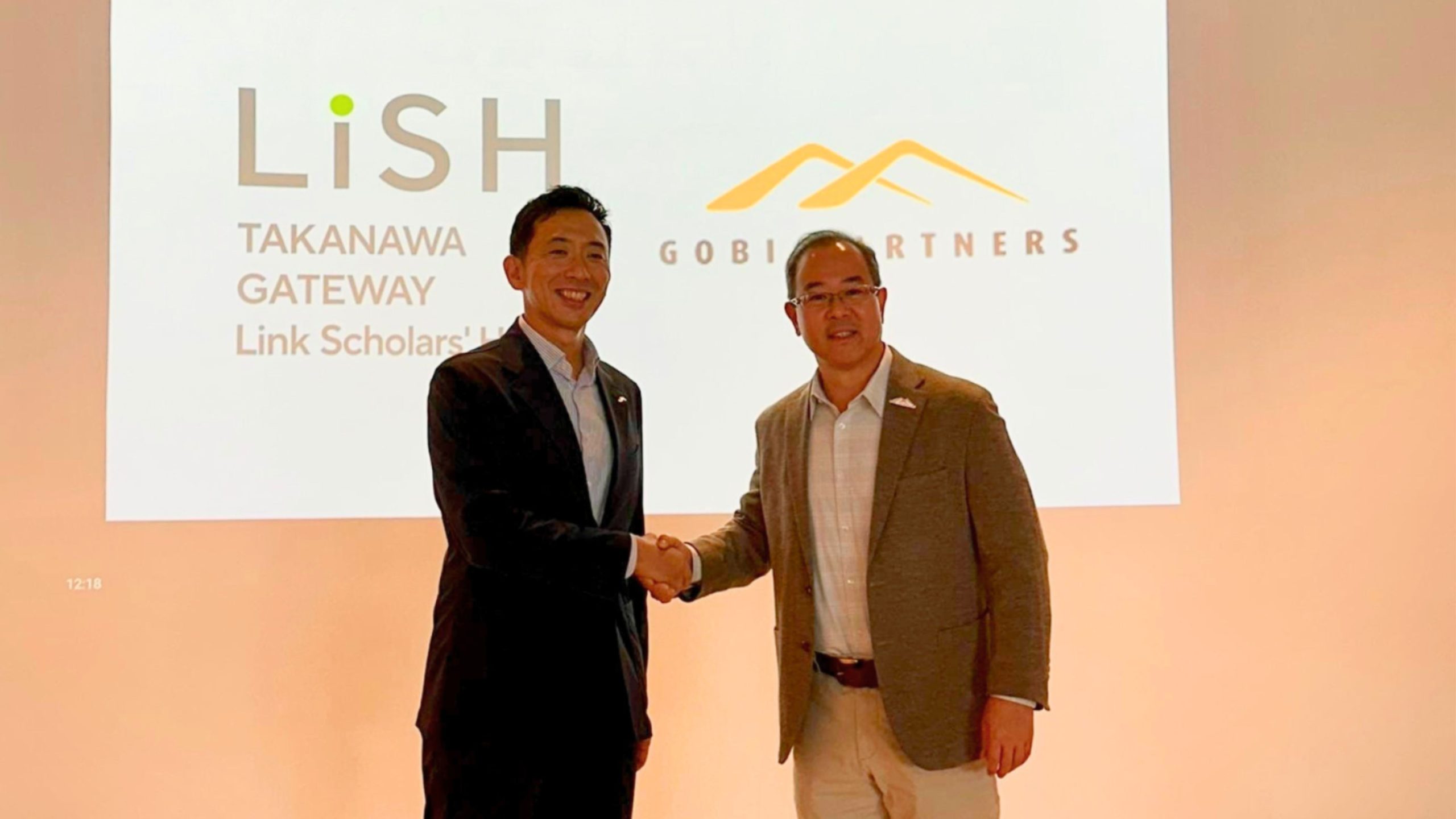AsiaTechDaily – Asia's Leading Tech and Startup Media Platform

Gobi Partners Enters Japan to Build a New Venture Bridge with Southeast Asia
The VC firm joins Takanawa Gateway City’s innovation hub to drive co-investments across Japan and Southeast Asia. A strategic move to connect Japan’s corporates with SEA startups through co-creation, capital, and commercialization.
Gobi Partners has made its entry into Japan by joining the TAKANAWA GATEWAY Link Scholars’ Hub (LiSH) as a Global Network Partner — a move facilitated by East Japan Railway Company (JR East). Rather than treating Japan as a standalone market, the firm is positioning itself at the meeting point of two very different innovation landscapes: Japan’s established industrial and tech ecosystem and Southeast Asia’s momentum-driven startup scene.
LiSH, located in TAKANAWA GATEWAY CITY and directly linked to Tokyo International Airport, opened in May 2025 as part of JR East’s next-generation smart-city development. Designed as a “global gateway” for startups, corporations, and researchers, the hub serves as a platform for developing technologies and business models that will define the future of urban life. Gobi’s presence there positions the firm at the centre of Japan’s latest push to attract innovation and global partners.
From Regional VC to Cross-Border Bridge
Gobi’s Japan expansion signals a shift in how the firm wants to operate in Asia. Rather than only backing Southeast Asian founders and helping them scale domestically, Gobi is now explicitly positioning itself as a bridge between Japan and Southeast Asia.
The idea is straightforward but ambitious:
- Match Japan’s industrial capabilities, capital, and technology
- With Southeast Asia’s founder-led agility, digital-native markets, and demographic growth
As Gobi co-founder and chair Thomas G. Tsao puts it, the firm wants to place itself “in the middle” of what he sees as the next wave of cross-border venture activity. In practice, that means more than just syndicating deals—it means building structures where Japanese corporates, Southeast Asian startups, and regional investors can co-create, co-invest, and co-scale.
LiSH as a Launchpad, Not Just a Location
LiSH is central to this strategy. The hub is designed as a collaborative environment where:
- Startups work on applied technologies with immediate relevance to urban living
- Corporates test new models for mobility, logistics, retail, energy, and city services
- Researchers bring in long-term perspectives and technical depth
With direct access to Tokyo’s transport network and airport, LiSH also serves as a soft-landing zone for international founders entering Japan. Gobi’s role as a Global Network Partner is to plug Southeast Asian companies into this environment—facilitating pilots, strategic partnerships, and, ultimately, cross-border growth.
This is a different model from a conventional VC office. Instead of operating on the sidelines, Gobi is embedding itself inside an active innovation hub created by one of Japan’s largest corporates.
A Convergence Built Over Years
Gobi’s move into Japan is not a sudden pivot; it builds on a series of earlier initiatives. The firm has:
- Co-hosted the Malaysia–Japan Innovation & Capital Forum with the Tokyo Stock Exchange (TSE) and JETRO, bringing together policymakers, investors, and founders to discuss IPOs, M&A, and co-creation.
- Partnered with Japan-based funds, such as Cross Capital, to direct Japanese capital into Southeast Asia’s digital economy.
These efforts have helped Gobi understand Japanese investor expectations, corporate priorities, and regulatory constraints—knowledge that is crucial when structuring cross-border deals. The new LiSH partnership is effectively a formalization and scaling-up of this existing collaboration.
Portfolio Signals: Japan Is Already in the Picture
Gobi’s portfolio already reveals deep ties with Japanese strategic partners. Several Southeast Asian startups backed by Gobi have received investment or strategic support from well-known Japanese corporates, including:
- JULO – backed by Saison Group
- CompAsia – backed by OSK SBI Group
- iStore iSend – supported by Yamato Transport
- Glints – backed by Persol Group
- Funding Societies – supported by Cool Japan Fund
- Animoca Brands – with investment from Sumitomo Corporation and Kodansha
- Carsome – backed by MUFG and Daiwa Securities Group
These relationships demonstrate that Japan is not new to Gobi’s universe. What changes with the LiSH partnership is the intensity and structure of engagement: instead of ad hoc connections, Gobi now has a physical and institutional base to coordinate more systematic Japan–SEA deal flow.
Policy and Capital Flows Are Pushing in the Same Direction
Gobi’s timing aligns with Japan’s broader startup agenda. Under the Startup Development Five-Year Plan (2022–2027), Japan aims to create 100,000 startups and 100 unicorns, with cross-border collaboration as a key pillar.
At the same time:
- Venture funding in Japan grew by 35 percent in 2024
- Southeast Asia drew more than US$5 billion in early-stage funding during that timeframe.
These numbers point to a region where capital is increasingly mobile, and where both Japan and Southeast Asia are looking beyond their own borders for the next phase of growth. Japan brings mature industries, large balance sheets, and a need for new growth engines; Southeast Asia brings young markets, digital adoption, and a pipeline of venture-ready founders.
Gobi is trying to sit exactly at this intersection.
What This Means for Founders and Investors
For Southeast Asian founders, Gobi’s Japan expansion could unlock:
- Access to Japanese corporates as customers, partners, or acquirers
- Exposure to Japan’s public markets and later-stage investors
- Opportunities to test products in one of the world’s most demanding but sophisticated markets
For Japanese investors and corporates, it provides:
- A curated channel into Southeast Asia’s startup ecosystem
- A partner that can help navigate local markets, regulations, and founder communities
- Co-investment and co-creation opportunities aligned with Japan’s push to globalise its innovation footprint
For other VCs, the move is a reminder that regional edge may increasingly come from building cross-border operating models, not just domestic portfolios.
Conclusion: A Test Case for Regional Venture Integration
On the surface, Gobi Partners’ entry into Japan via LiSH is one more piece of expansion news in a busy venture capital market. But viewed in context, it looks more like a test case for how Asia’s venture landscape might evolve in the next decade.
By using a smart-city innovation hub as its base, working alongside a major corporate like JR East, and leveraging a portfolio already intertwined with Japanese strategics, Gobi is betting that the next phase of value creation will come from bridging ecosystems rather than operating within them in isolation.
If Gobi can help turn Japan’s industrial strength and Southeast Asia’s startup momentum into repeatable, cross-border outcomes—co-investments, joint ventures, exits, and category leaders—it could create a new template for how capital, technology, and talent move across Asia.
For now, one thing is clear: Japan is no longer just a capital source or exit destination in Gobi’s strategy. It is becoming a core partner in building the next wave of regional venture stories.
Quick Takeaways
- Gobi Partners has entered Japan as a Global Network Partner at JR East’s LiSH innovation hub in Takanawa Gateway City.
- The move aims to connect Japan’s industrial strength with Southeast Asia’s fast-growing startup ecosystem.
- Gobi plans to drive cross-border co-investments and enterprise–startup collaboration between both regions.
- Japanese corporates have already backed multiple Gobi portfolio companies across Southeast Asia.
- The expansion aligns with Japan’s Startup Development Five-Year Plan, targeting 100,000 startups and 100 unicorns by 2027.
- Venture activity across Asia is rising — Japan saw a 35% funding increase in 2024, while Southeast Asia drew over US$5 billion in early-stage capital.



